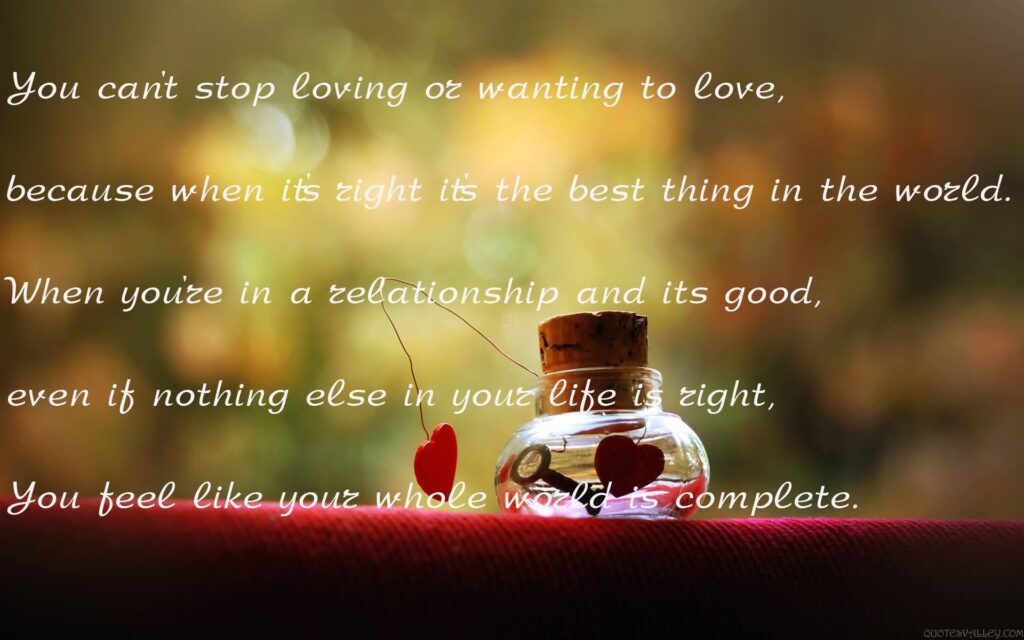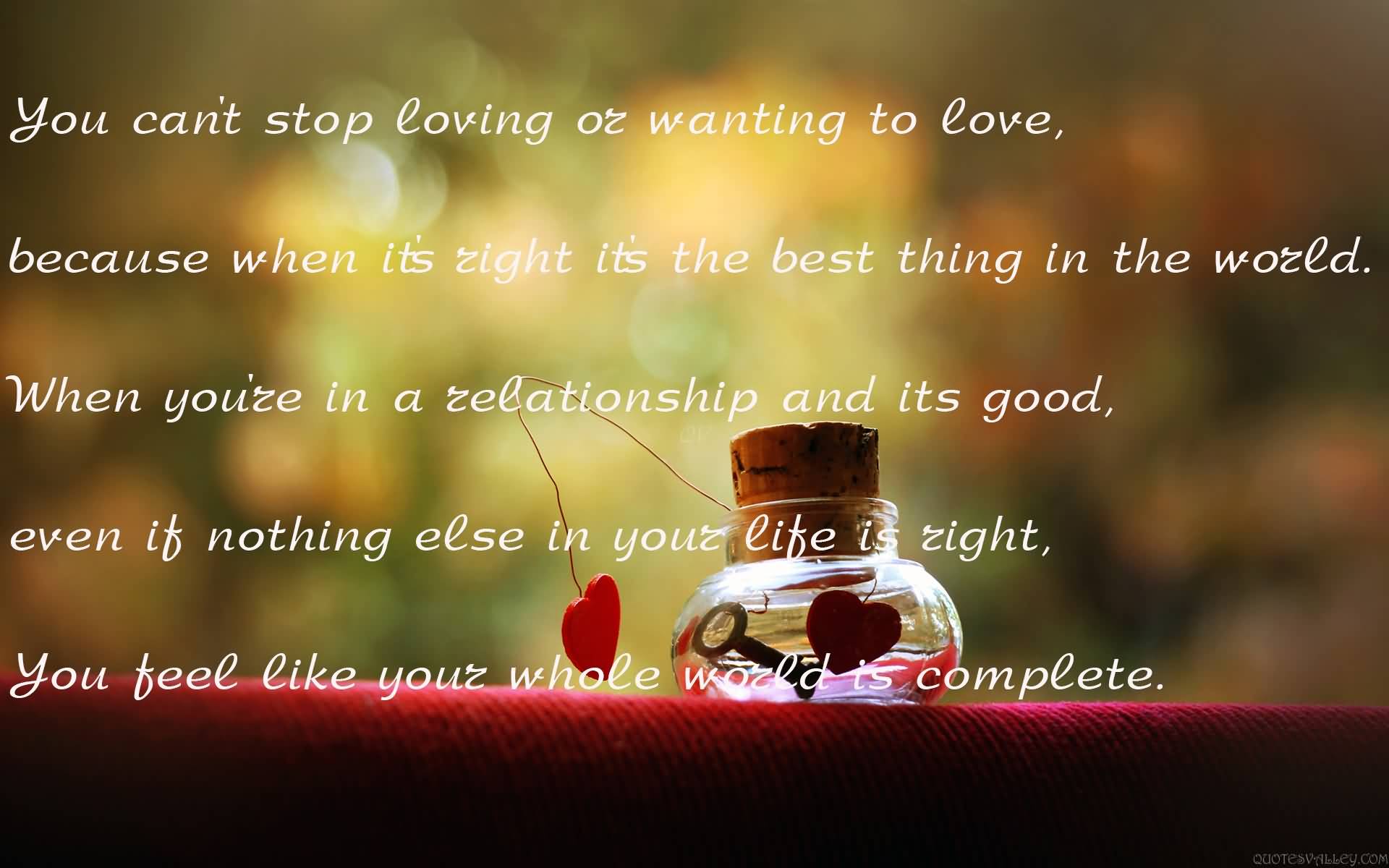
The Yearning Within: Understanding and Navigating the Desire of Wanting to Love
The human experience is often defined by connection, and at the heart of connection lies love. The feeling of wanting to love, to experience the profound joy and fulfillment that comes with sharing one’s life with another, is a universal desire. This yearning can manifest in various ways, from a general longing for companionship to a specific desire to find a romantic partner. Understanding this desire, its roots, and how to navigate it constructively is crucial for personal well-being and building meaningful relationships. This article delves into the complexities of wanting to love, exploring its psychological underpinnings, societal influences, and practical steps one can take to cultivate love in their lives.
The Psychology of Yearning for Love
The desire for love is deeply ingrained in our psychology. Attachment theory, developed by John Bowlby and Mary Ainsworth, suggests that our earliest experiences with caregivers shape our ability to form and maintain relationships throughout our lives. Secure attachment, characterized by trust and emotional availability, fosters a healthy capacity for intimacy. Conversely, insecure attachment styles, such as anxious or avoidant attachment, can lead to difficulties in forming and maintaining loving relationships. These individuals may experience heightened anxiety about rejection or struggle with vulnerability and intimacy. Wanting to love can therefore be seen as a fundamental human need, rooted in our innate desire for connection and security.
Maslow’s hierarchy of needs also sheds light on the importance of love and belonging. According to Maslow, after physiological and safety needs are met, individuals seek love, affection, and a sense of belonging. This need for connection drives us to form friendships, romantic relationships, and family bonds. When these needs are unmet, individuals may experience feelings of loneliness, isolation, and depression. The feeling of wanting to love becomes particularly acute when individuals feel disconnected from others and long for a sense of belonging.
Societal Influences on the Desire for Love
Society plays a significant role in shaping our perceptions of love and relationships. From fairy tales to romantic comedies, we are constantly bombarded with messages about the ideal romantic partner and the pursuit of “happily ever after.” These narratives can create unrealistic expectations and pressure individuals to conform to societal norms. Social media further amplifies these pressures, with curated images of seemingly perfect relationships often leading to feelings of inadequacy and comparison. The constant exposure to idealized versions of love can intensify the feeling of wanting to love and create a sense of urgency to find a partner.
Cultural norms and values also influence our understanding of love and relationships. In some cultures, arranged marriages are still common, while in others, individual choice and romantic love are prioritized. These cultural differences can impact how individuals approach relationships and the expectations they have for their partners. Furthermore, societal attitudes towards singlehood and relationships can influence how individuals perceive themselves and their desire for love. The feeling of wanting to love can be particularly challenging for individuals who feel pressured to conform to societal expectations and find a partner.
Navigating the Desire: Practical Steps
Wanting to love is a powerful feeling, but it’s important to approach it with intention and self-awareness. Here are some practical steps you can take to navigate this desire constructively:
Cultivate Self-Love and Acceptance
Before you can truly love another person, it’s essential to love yourself. This means accepting your flaws, celebrating your strengths, and treating yourself with kindness and compassion. Practice self-care activities that nourish your mind, body, and soul. Engage in hobbies that bring you joy, spend time with loved ones, and prioritize your well-being. When you cultivate self-love and acceptance, you become more confident and attractive to others. You are also less likely to settle for unhealthy relationships or seek validation from external sources. Embracing self-love is a crucial step in preparing yourself for a fulfilling and healthy romantic relationship. The journey of wanting to love often begins with loving oneself.
Challenge Unrealistic Expectations
Examine your beliefs about love and relationships. Are you holding onto unrealistic expectations that are hindering your ability to find a partner? Let go of the idea of the “perfect” partner or the “happily ever after.” Instead, focus on finding someone who is compatible with you, who shares your values, and who treats you with respect and kindness. Remember that relationships require effort, compromise, and communication. Be willing to work through challenges and embrace the imperfections of both yourself and your partner. It’s also important to recognize that relationships evolve over time, and what you need from a partner may change as you grow and develop. [See also: Healthy Relationship Expectations]
Expand Your Social Circle
Increase your opportunities to meet new people by expanding your social circle. Join clubs or organizations that align with your interests, attend social events, and participate in volunteer activities. Online dating can also be a useful tool for meeting potential partners, but it’s important to approach it with realistic expectations and a healthy dose of skepticism. Be open to meeting people from different backgrounds and with different perspectives. You never know where you might find love. The act of wanting to love often involves actively seeking out opportunities for connection.
Focus on Building Meaningful Connections
Instead of focusing solely on finding a romantic partner, prioritize building meaningful connections with the people in your life. Nurture your friendships, spend time with family, and engage in activities that foster a sense of community. Strong social connections can provide a sense of belonging and support, which can help alleviate feelings of loneliness and isolation. Furthermore, building meaningful connections can enhance your overall well-being and create a more fulfilling life, regardless of your relationship status. The feeling of wanting to love can be partially satisfied by cultivating strong platonic relationships. [See also: Benefits of Strong Social Connections]
Be Open to Vulnerability
Vulnerability is essential for building intimacy and connection. Be willing to share your thoughts, feelings, and experiences with others. Allow yourself to be seen and heard, even if it feels uncomfortable. Remember that vulnerability is not a sign of weakness, but rather a sign of courage and authenticity. When you are open to vulnerability, you create space for deeper connections and more meaningful relationships. The act of wanting to love requires a willingness to be vulnerable and authentic.
Practice Mindfulness and Gratitude
Cultivate mindfulness and gratitude to enhance your overall well-being and appreciate the present moment. Practice mindfulness by paying attention to your thoughts, feelings, and sensations without judgment. Gratitude involves focusing on the positive aspects of your life and expressing appreciation for what you have. When you practice mindfulness and gratitude, you become more aware of your inner world and more appreciative of the beauty that surrounds you. This can help alleviate feelings of loneliness and isolation and create a more positive outlook on life. Even while wanting to love, appreciating the present and practicing gratitude can enhance overall well-being.
The Importance of Patience and Self-Compassion
Finding love takes time, and it’s important to be patient with yourself and the process. Don’t get discouraged if you don’t find a partner right away. Focus on building a fulfilling life for yourself and trust that love will come when the time is right. Be kind to yourself and practice self-compassion, especially during times of disappointment or loneliness. Remember that you are worthy of love, regardless of your relationship status. The feeling of wanting to love can be intense, but it’s crucial to approach it with patience and self-compassion. Wanting to love and finding love are two different things and it’s important to be patient with yourself during the process. Remember that wanting to love is a normal feeling.
Conclusion
The desire for love is a fundamental human need, and wanting to love is a natural and valid feeling. By understanding the psychological and societal influences on this desire and taking practical steps to cultivate self-love, build meaningful connections, and be open to vulnerability, you can navigate this yearning constructively and create a fulfilling life, whether or not you are in a romantic relationship. Remember to be patient with yourself, practice self-compassion, and trust that love will come when the time is right. Embrace the journey of wanting to love, and allow yourself to be open to the possibilities that lie ahead. The journey of wanting to love is a personal one, and it’s important to approach it with intention, self-awareness, and a willingness to grow and evolve. Ultimately, the goal is not just to find love, but to create a life filled with joy, connection, and meaning. The feeling of wanting to love is a powerful motivator, and it can inspire you to become the best version of yourself.

